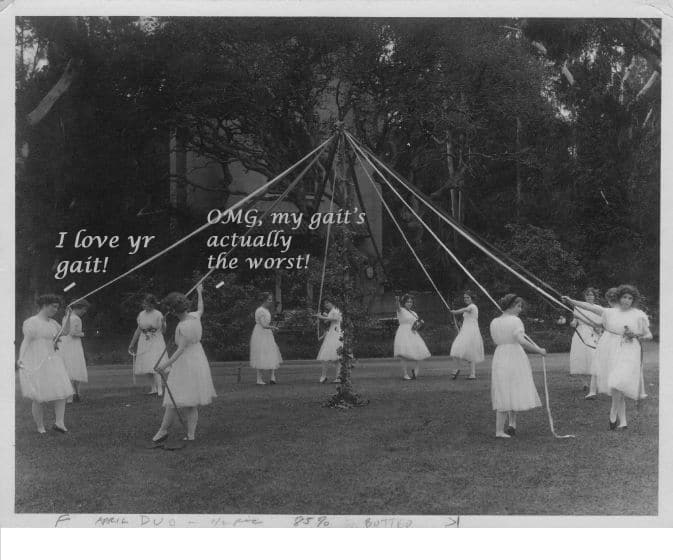No, this isn’t a rehashed essay from the 1800s on how best to sport your chastity belt during May Day celebrations. I’m referring to a different, although not totally unconnected, kind of modesty: the way in which we (Canadians, and perhaps ladies in particular) are inclined to schluff off our beauty and success in service of a graciousness and timidity that’s better suited to the days when we rubbed foggy apples to find out the names of our future husbands, and when all complaints were cured with a leech and a prayer (the original LP, yo).
Nowhere is this confused “modesty” more obvious than in a group of women grooming/getting dressed/primping together—be they strangers in a public washroom or besties on a Friday night pre-dancefloor. Inevitably, someone will point out someone else’s enviable something (style/ass/sense of humour/whatever) to which that someone quickly replies with all the ways that she is actually lacking in that area. I’ve developed a habit of telling the compliment-er that she’s “crazy,” and that I am, in fact, “fairly garbage-y right now”—even if I’m not feeling at all garbage-y! Wha?! That response is both ungracious and false; I’m cultivating insecurity where there often is none, and for what? It’s doing no one a service. In the immortal words of Stephanie Tanner: “How Rude.”
Such situations have even dissolved into an impromptu round of “self-deprecation scramble”—all bets are off as we’re suddenly pitting this embarrassment against that haircut or that breakout in an effort to emerge as Miss Most Modest (or Lassie Least Successful, or Non-Threatening…Irma?). Now, why should that be the conversation that arises when intelligent, beautiful, down-ass women get together? (ESPECIALLLY IF THEY HAVE COOL NAMES LIKE IRMA.)
Don’t get me wrong; insecurities are real. There are a buttload of things I could (and do!) criticize about my own appearance and character. But if I’m willing to admit it, there’s probably an equal or even larger buttload of things that I’m great at, and a ton of ways in which I’m actually pretty damn lovable. So, why is it that I am only comfortable articulating the former? And why does that seem to be the acceptable norm? It feels a little back-asswards (wow, I’m loving this butt motif, guys) to exclusively notice and comment on others’ positive qualities while actively denying one’s own.
More than that, it can be scary to acknowledge that you may have something that someone else wants, lest jealousy and (OMG) conflict should occur. But everyone has something that could be perceived as enviable (is great with kids; can operate a camera—like, a real camera, like, a sexy camera with a focus; has amazing dimples; makes THE BEST hashbrowns; whatever); what would happen if we were all just more out in the open about it? Maybe we’d chill out and be good at stuff and IS THAT WHAT UTOPIA IS?
I know I’m simplifying. Self-deprecation can be hilarious and necessary and I do not by any means propose doing away with it. I’m merely suggesting the following:
1) That we develop a simple awareness of our tendency to self-deprecate, and a mindfulness of when we choose to employ it.
2) That we balance our very polite and palatable modesty with a modicum of swagger. I mean, we’ve all heard the songs (thanks, Beyonce!), but have we really thrown our hands up in the air and waived them around like we just don’t care? I know I haven’t.
And that is why, dear internet, this new year, I resolve to stand behind my achievements and the things I dig about myself, and not freak my face with jealousy at the Swagger of Others (maybe that’s the title of my memoirs?).
So Happy New Year, STDC! Let’s make a Beyonce playlist (Solange, too—why not?), and party like it’s Nineteen-Ninety-Now!
~ Tess Degenstein



 Follow Us On Instagram
Follow Us On Instagram
